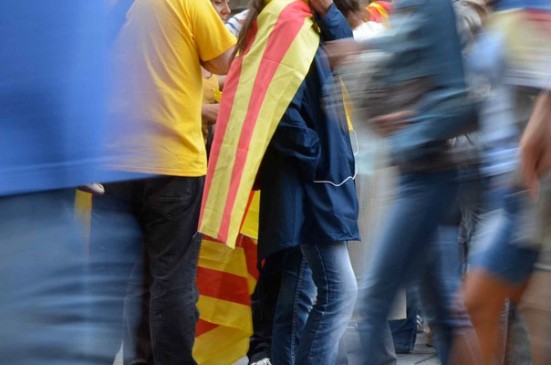
La Diada Nacional de Catalunya (Source)
The National Day of Catalonia or La Diada Nacional de Catalunya on 11th September each year was first celebrated in 1886. The 11th September is a historic date in the Catalan calendar. The day, simple known as La Diada, commemorates the 14 month Siege of Barcelona, and when on the 11th September 1714, Catalan troops were forced to surrender to the Castilian forces of France and Philip V of Spain towards the end of the War of the Spanish Succession. It was unfortunately all pretty much downhill from there for the next 250 years. All institutions of Catalonia were destroyed and they became part of the Spanish kingdom.
Many Catalans have been battling this repression ever since. Most recently from the Spanish dictator, Francisco Franco. The National Day of Catalonia was reinstated after 94 years in 1980, five years after Franco’s death in 1975. Catalonia today is at least an autonomous community. Though this is still far from acceptable for many. Read the rest of this article…
 The new issue of InTransit is out. InTransit is an English language publication containing articles that have appeared in the Catalan-speaking press.
The new issue of InTransit is out. InTransit is an English language publication containing articles that have appeared in the Catalan-speaking press.
This issue is very much the interview issue. There’s interviews with the artist, Jaume Plensa, the writer and philologist, Jaume Cabré and the artistic director of the Sydney Dance Company, Rafael Bonachela.
Plus there’s a piece from Barcelona Metropolitan on the Barcelona-born film director, Isabel Coixet.
And did you know, “…the birth of modern submarine technology is very much linked to the life of the Catalan politician and inventor Narcís Monturiol”. I didn’t. Read the rest of this article…
 Issue 3 of my favourite English language Eurocatalan newsletter is out today. Read my previous post on this newsletter if you haven’t already.
Issue 3 of my favourite English language Eurocatalan newsletter is out today. Read my previous post on this newsletter if you haven’t already.
From the website:
This new issue of InTransit includes many different articles that help us better understand this historical spirit of Europeanism, and also what an opportunity it would be if the Mediterranean Euroregion were to become an economic and cultural reality within a united Europe. In short, the Commonwealth of the South.
Eight or so articles about Catalonia’s place in Europe now and in the past. Interesting articles were:
You can download the full PDF version of the current issue below:
 It’s not often I find a website that makes me stop what I’m doing and an hour later feel like it hasn’t been a complete waste of my time – which is usually the case with YouTube (as entertaining as that hour often is) – but the InTransit website did just that. Read the rest of this article…
It’s not often I find a website that makes me stop what I’m doing and an hour later feel like it hasn’t been a complete waste of my time – which is usually the case with YouTube (as entertaining as that hour often is) – but the InTransit website did just that. Read the rest of this article…








